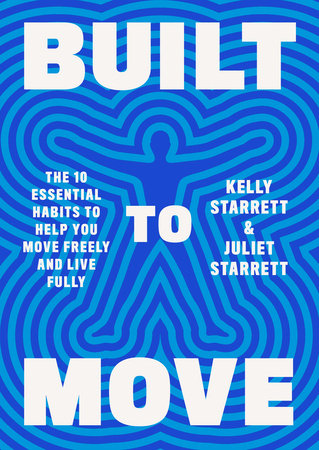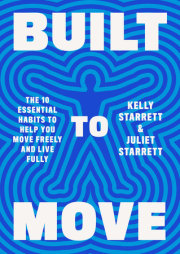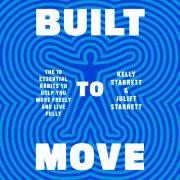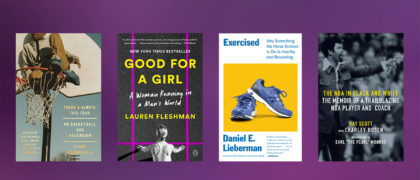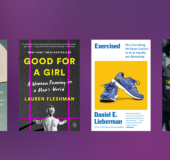The innovators behind The Ready State and the movement bible Becoming a Supple Leopard present 10 practices proven to enhance mobility, make you feel energetic and alive, and, like a good 401(K), prepare your body for whatever comes its way in the future.
After decades spent working with pro-athletes, Olympians, and Navy Seals, mobility pioneers Kelly and Juliet Starrett began thinking about the physical well-being of the rest of us. What makes a durable human? How do we continue to feel great and function well as we age? And how do we counteract the effects of technology-dependence, sedentary living, and other modern ways of life on our body’s natural need for activity? Our bodies, after all, were built to move.
The answers lie in a simple formula for basic mobility maintenance: 10 tests + 10 physical practices = 10 ways to make your body work better.
Organized around ten assessments and ten physical practices that anyone can do, Built to Move is designed to improve the way your body feels—less stiffness! fewer aches and pain!— and boost the overall quality of your life, no matter how you spend your time. The book offers:
· Easy mobilization practices to increase range of motion and avoid injury
· Uncomplicated guidelines for improving nutrition and sleep
· Breathing strategies to help you move more freely and manage stress and pain
· Advice on easy ways to change sedentary habits and integrate more movement into your daily life.
This is the first body book written for exercisers and nonexercisers alike. It’s full of foundational wisdom for everyone from professional athletes to gym haters and everyone in between. Built to Move introduces readers to a set of simple principles and practices that are undemanding enough to work into any busy schedule, lead to greater ease of movement, better health, and a happier life doing whatever it is you love to do—and want to continue doing as long as you live. This book is your game plan for the long game.
“Juliet and Kelly Starrett have given you a detailed, accessible road map to help you move through life feeling better, stronger, and more confident than you ever imagined, no matter where you’re starting from. There is no body this book will not revolutionize.” —Melissa Urban, cofounder of Whole30
“Every time my body asks, ‘What did you do to me?’ I go to the Starretts for answers. They’ve opened my eyes to simple and astonishingly effective approaches to back pain, hamstring pulls, and sore Achilles tendons. Now they’re offering my personal dream come true — a way to get ahead of the injuries before they happen.” —Christopher McDougall, author of Born to Run
“Built to Move is a must-read for anyone with a body—that is to say, you. The Starretts have written a sweeping yet easy-to-understand and practical guide for anyone who wants to live healthier in the 21st century, from professional athletes to those well beyond retirement age. The book’s strength lies in how it blends the authors’ decades of cutting-edge practice with breaking science to help us live longer and better. Critically, Built to Move inspires action. It changed how I live my life, and I'm better for it. It'll do the same for you.” —Michael Easter, author of The Comfort Crisis
“Built to Move is a game-changer. Most fitness books stop at the proverbial gym door; the Starrett's crash through that door and show that the most important work for better health happens outside the gym, and it's available to literally everyone.” —David Epstein, author of Range: Why Generalists Triumph in a Specialized World
“Whether you are a professional athlete, a serious weekend warrior, or, like most people, just trying to fit it in, Juliet and Kelly are there every step of the way. The Starretts have created an accessible path for helping us all live a more fulfilled and pain-free life. There is a time and a place for getting obsessed with how much weight one can lift or have fast someone is, but we all need the basics to build our foundations upon true principles spelled out in Built to Move.” —Gabrielle Reece, professional athlete and author of My Foot is Too Big for the Glass Slipper
“Built to Move is the definitive guide for building an all-around healthy and high-performing body and mind. What makes Built to Move so valuable is not just the extensive real-world experience that went into formulating the protocols it describes, or the rigorous peer-reviewed scientific studies those protocols are based on, but its elegant simplicity. Built to Move makes exactly clear what we all need to do, and when, and how, so that anyone can reach their health goals, regardless of current fitness, income level, or life demands. [This] should be (self-) assigned reading for anyone looking to enhance their mental or physical health and performance.” —Andrew Huberman, Professor of Neuroscience, Stanford University & Host of The Huberman Lab Podcast
“The Starretts are the epitome of what a Spartan is. I LOVE that they are so focused on mobility. Maintain mobility and you’ll be able to do anything. Built to Move is an amazing book.” —Joe De Sena, Founder and CEO of Spartan
“Through practices that are engaging, introspective, and fun—yes fun!—Built To Move is the roadmap we have been waiting for that will revive what has always been your most valuable birthright: to move your body with confidence, pride, and play.” —Jen Widerstrom, Celebrity Trainer, CEO, Author, Speaker
“Built to Move is a long overdue compilation of essential practices we all need to feel vital and functional. This simple guide is the body’s operational manual that we were not given at birth. This is not a training resource; this is a life tool to be implemented now and used forever. You’ll find yourself having fun brushing your teeth on one leg, deep breathing while walking, and activating muscles while standing in line. . . . You’ll start to feel alive and vital the moment you implement these tools into your daily life.” —Rebecca Rusch, 7-Time World Champion, Emmy Award Winner, Speaker, Entrepreneur
“Built to Move provides a daily living manual that can be implemented on a long-term basis. I’ve watched for years how Kelly and Juliet delivered their knowledge of movement, mobility, and injury reduction for the Army’s Rangers. Now you can use this [book] to maximize your athletic performance and significantly enhance your comfort for a healthy life. We are all built to move!” —Mike Ferriter, Lieutenant General (Retired), US Army Ranger, President & CEO National Veterans Memorial and Museum
“Kelly and Juliet have long been at the forefront of translating complex health and fitness concepts into practical, accessible tools that can help us move better. They are masters in this domain and Built to Move distills their vast knowledge into widely applicable daily habits and tools that won’t just help you move better but live better as a result.” —Kate Courtney, Mountain Bike World Champion, World Cup Overall Winner, Olympian
“The Greek philosopher Aristotle was quoted as saying, ‘Life is movement.’ If this is true, then we have been living less capable lives in recent years. Kelly and Juliet Starrett are not going gentle into that good night but raging against poor movement by providing a framework to live a more robust life. Through the implementation of their daily routine you can reclaim function and find your best self.” —John Welbourn, former NFL footballer and Power Athlete
“Built to Move should be the standard movement practice we all start living by and teaching future generations.” —Matt Vincent, Highland Games World Champion
“All of us, athletes and everyone else, need strategies for daily living. This book has amazing, life-changing insights on how to stay active and pain-free.” —Georges St. Pierre, 2 Division UFC Champion and Actor
“We take it for granted that our complex bodies will just keep on going forever in excellent condition, which is like buying a Ferrari and leaving it sitting out in the weather all year long, for years on end, and expecting it to just continue to work perfectly. This book needs to be the curriculum for any human who moves and desires to move well. Read it. Your body will thank you.” —Ben Greenfield, author, coach, and speaker

